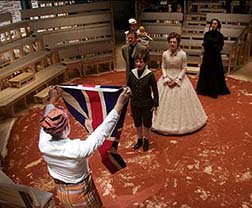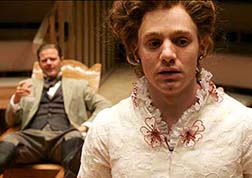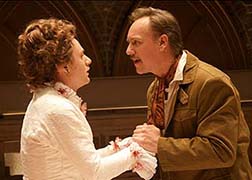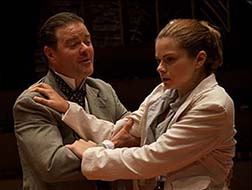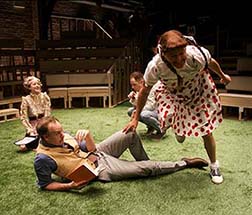
Lucy
Komisar
| “Cloud
Nine” cleverly skewers British imperialism, “Cloud Nine.” Cloud Nine, of course, is that place of ecstasy in the metaphorical sky where love and/or sex takes one. Caryl Churchill’s 1979 play is a quirky la ronde set in Africa in 19th-century Victorian times and London in 1979. Except that most of the characters of the second half are the same as the first, played by different actors. And compressing time, the events of Act 2 take place only 25 years later. The wit of the first part, skewering British imperialism, racism, sexism, makes the cartoon empire and its inhabitants bitingly funny. Director James Macdonald paints the satire with delicate brush strokes.
Lacking comparable politics, the second part bogs down in people’s soap-operish confusion, unhappiness and coming to terms about sex. It is tedious and boring. The first part occurs in British colonial Africa, where Clive (Clarke Thorell), in black boots, jodhpurs and a white jacket with cravat, presides self-importantly over his family and retainers. He mimics the hierarchy of the larger world he admires, the British empire and the Queen, in the attitude he displays towards his wife, children and servants. Of course, the hypocrisy is thick enough to cut. And in rhymed couplets, yet. The British flag is unfurled at the start by an African servant, Joshua (played by a white man, Sean Dugan), who loves his master and denigrates “his people,” who he insists are not his people. “My skin is black but oh my soul is white.
Dugan intones this self-hatred with a stone face, as if he were a robot. Almost echoing that, wife Betty (played by a man, Chris Perfetti), is equally supine, declaring that all she wants is to serve: “I live for Clive. The whole aim of my life The point being that women are servants with servants’ mentalities. And don’t worry, things will get worse.
Not all is as it seems. In a variation of La Ronde, everyone in the entourage pursues another. Clive is smitten by a neighbor, the assertive Mrs. Saunders (well played by Izzie Steele), whose husband has died. Betty is smitten by Harry Bagley (John Sanders), a macho fellow in bush jacket and pants who spends most of his time in the jungles. Harry has had a secret relationship with young Edward (a devilish Brooke Bloom), Clive and Betty’s son, who dismays his parents by playing with a doll. Then there is Ellen the governess (also Izzie Steele), who has a thing for Betty. Perfetti does Betty without too much camp. Churchill is wonderful at mixing racism and sexism. Bagley tells Saunders, “You have been thought of where no white woman has been thought of before.” Shortly after, he says to Joshua, “Shall we go into the barn and f—k.”
At one point Clive disappears under Saunders’ skirt. She says, “I wish I didn’t enjoy the sensation, because I don’t like you, Clive.” Not too long after, suspicious of Bagley and Betty, Clive tells his wife, “Women can be treacherous and evil. They are darker and more dangerous than men. The family protects us from that.” But if she were unfaithful, his duty would be to cast her off. Clive talks of natives as savages. He orders Joshua to flog the stable boys. He explains with no hint of irony, “You can tame a wild animal only so far. They revert to their true nature and savage your hand. Sometimes I feel the natives are the enemy. I know that is wrong. I know I have a responsibility towards them, to care for them and bring them all to be like Joshua.” But we see who the real savages are. The darkness of the comedy, of course, is that these caricatured figures were true. And in the 1970s, following a period of feminist and political radicalism, there was ironic humor in that pointed look back. But in the second act, taking place in 1979, there are no more obeisances to the male/female couple, just some largely joyless coupling. The problem with this very tedious Act 2, is that it’s just a ronde of people’s sexual predilections without much wit at all. Or maybe the wit is too broad.
I did like over-the-top Cathy (Clarke Thorell, who has traded his black boots for saddle shoes and pigtails). Cathy’s mother Lin (Izzie Steele) is a teacher and a lesbian who declares, “I hate men.” Betty is leaving her dreadful husband and lauds self-pleasuring. Edward is gay. Another character, Martin (Sanders), says “I have read the Hite report,” and “I’m writing a novel about women from the women’s point of view.” Was Churchill trying to skewer the new “liberated” attitudes about sex? If she was, I didn’t find any of it clever.
Visit Lucy Komisar’s website http://thekomisarscoop.com/. |
| museums | NYTW mail | recordings | coupons | publications | classified |
